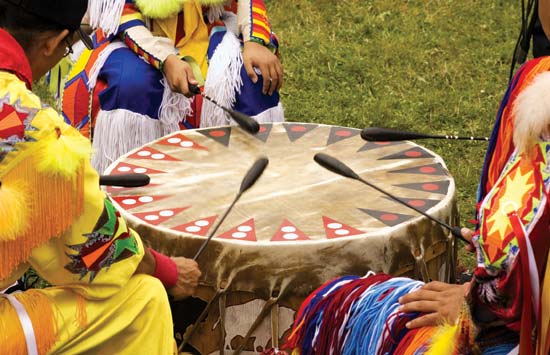
By the early twentieth century, the United States was arguably best-known for being a “melting pot”: Its citizens had come from all over the world. It was also, in the grand scheme of human history, a country still in its infancy. Most national aesthetic identities have been cultivated over the course of millennia, or at least more than a few centuries. Since the United States hadn’t seen even two full centuries by Leonard Bernstein’s time, naturally it had yet to cultivate its own unique national aesthetic and identity. Geoffrey Block explores this phenomenon through the lens of Bernstein, a composer in great part responsible for defining America’s musical identity (along with Gershwin, Copland, and several others). Bernstein was certainly a major influence on the consensus that jazz was the first uniquely American “contribution…to music” (Kaufmann, ix-x). Block’s study of Bernstein’s search for the “American sound” exposed me to the rationale behind how jazz came to be the sole representative of a uniquely “American” sound — to the exclusion of indigenous music.
Now, I have deliberately referred to our country as “the United States” multiple times above, instead of “America,” to highlight a critical distinction: indigenous peoples have their own rich, distinctive art and music cultures, but both they and their music are so rarely given serious consideration. It was difficult for me to find research explaining exactly why Native American music has been largely ignored by prominent American composers (though lesser-known composers have tried to pay homage to it). However, I argue that basic history allows for educated speculation: Native American peoples are, indisputably, American. But their societies were not inducted as citizenry into the United States until 1924 – not that said societies would have immediately been clamoring for citizenship status once the U.S. gained independence. And who could blame them? Following what I contend was the near-genocide of Native American societies, the U.S. government conceded to them land reservations and sovereignty. These new geographic delineations isolated native and colonial/immigrant populations from each other, causing a decline in interaction between the two groups. If United States mainstream society is rarely (if ever) exposed to indigenous cultures, native music will inevitably be snubbed. The racism inherent in colonialism must have contributed to the lack of public school curriculum devoted to Native American cultures. Indigenous music therefore became irrelevant to the masses – and such irrelevance makes it overwhelmingly difficult for most of the United States to embrace indigenous music as part of its broad national identity. Bernstein and Gershwin have both cited this phenomenon as the explanation for their refusal to consult Native American music as part of their exploration of “American” sound.
I understand that national identity requires mass appeal and resonance for a country’s vast majorities, but I would be much more understanding of Gershwin and Bernstein’s reasoning if it hadn’t been accompanied by such insensitive, outright dismissal. These two prominent composers had the respect and notoriety to bring indigenous music to the mainstream but chose not to do so, because that would have been too difficult. Setting their sights on jazz was undoubtedly easier, since it was well-known domestically, and was also granted Europe’s seal of approval (particularly France’s). For both America’s artistic elite and its average citizen, European endorsement signifies a valid seat on the world stage – a serious style worthy of inauguration as national tradition.
Europe’s christening of jazz, in combination with its mass domestic appeal, is responsible for the consensus among music scholars that jazz is the most American of all uniquely American musical styles. As logical as that designation is, I still consider it a cop-out. I concede that indigenous music does not resonate with the average American, but when respected composers like Copland and MacDowell are praised for their works influenced by Native American music, the argument that composers can bring indigenous music to the mainstream in tandem with jazz shouldn’t be so easily dismissed. For this reason, I am left to wonder what would cause their contemporaries to snub it so adamantly. The most logical explanation is, simply, racism.
The question of “what is the ‘American’ sound” certainly has many answers. A melting pot nation is going to have difficulty defining its national identity. I certainly think there is, or can be, such a thing as “the American sound,” but I do not agree that it is only one sound. Jazz is one American sound. Blues is one American sound. Country and western music is one American sound. Reggaeton is one American sound (if, like me, you consider Puerto Rico part of the United States). But none of these sounds are any more or less American than the sounds indigenous to pre-colonial America. I completely understand the instinct to define the “American sound” as whatever was uniquely conceived of in America that also resonates with most of America. Jeremy Yudkin makes the compelling argument that we still need to look more to a comprehensive study of all popular and folk music in the United States to inform our identity. Gershwin made great strides in achieving that goal with Porgy and Bess, and despite his dismissal of indigenous music, set a precedent for bringing authentic non-European influences to European music tradition. However, ignoring the distinct music cultures indigenous to pre-colonial America is undoubtedly rooted in the racism that motivated colonialism in the first place, compounded by the geographic segregation of non-indigenous and indigenous Americans. The laziness and lack of respect seething from the interviews and writings of non-indigenous composers creates cyclical rejection of indigenous music: i.e., “we won’t write indigenous-influenced music because it doesn’t appeal to most people, and it doesn’t resonate with most people because they were never exposed to it, and they were never exposed to it because no one wrote indigenous-influenced music because it wouldn’t resonate with most people,” and so on ad infinitum.
Jazz is certainly a logical starting point for America to begin cultivating and asserting its unique musical identity, but can we not work backwards and bring indigenous music into the mainstream fold? Can we not at least try? I would never claim that a mainstream indigenous-European-classical fusion signifies the ultimate recognition of Native American music as valid – indigenous music is valid and important regardless of our ability to recognize it. I also don’t presume to claim that a mainstream indigenous-European-classical fusion is something that would bring Native American people further from the margins of American society — that is for indigenous people to claim. But to me, doing so seems like a start.
— SUSAN SMITH
Bibliography
Block, Geoffrey. “Bernstein’s Senior Thesis At Harvard: The Roots of a Lifelong Search to Discover an American Identity.” College Music Symposium 48 (2008): 52-68. http://0-www.jstor.org.lib.utep.edu/stable/25664807.
Chase, Gilbert. “American Music and American Musicology.” The Journal of Musicology 1, no. 1 (1982): 59-62. doi:10.2307/763636.
Kaufmann, Helen L. From Jehovah to Jazz: Music in America from Psalmody to the Present Day. New York, NY: Dodd, Mead & Company, 1937.
Noonan, Ellen. The Strange Career of Porgy and Bess: Race, Culture, and America’s Most Famous Opera. Chapel Hill: University of North Carolina Press, 2012.
Starr, Larry. George Gershwin. New Haven: Yale University Press, 2011.
Yudkin, Jeremy. “Chasin’ the Truth: The Lost Historiography of American Vernacular Music.” American Music 26, no. 3 (2008): 398-409. http://0-www.jstor.org.lib.utep.edu/stable/40071713.

I definitely agree with you that there’s not just one American sounding music. I also really liked your point about the mass murder of Native Americans, both in the way of actual murder, but also the societal suppression of their culture by effectively removing them from mainstream society. That was one point I had not considered. I also agree that the least we could do is alert people to the fact of this deep-seated racism and begin to dress the wounds that have been inflicted.
LikeLike